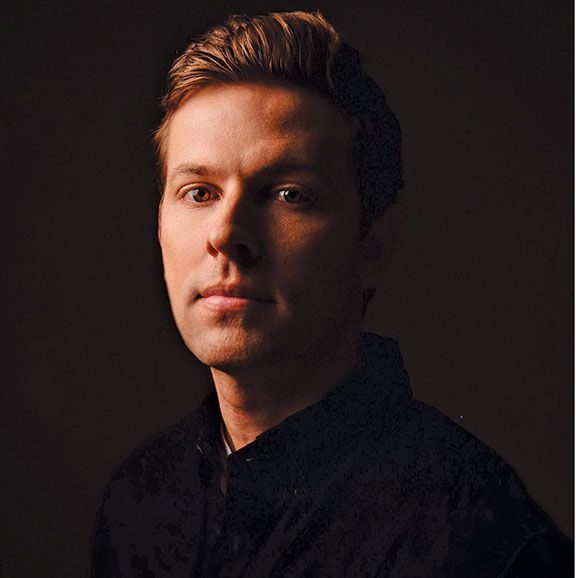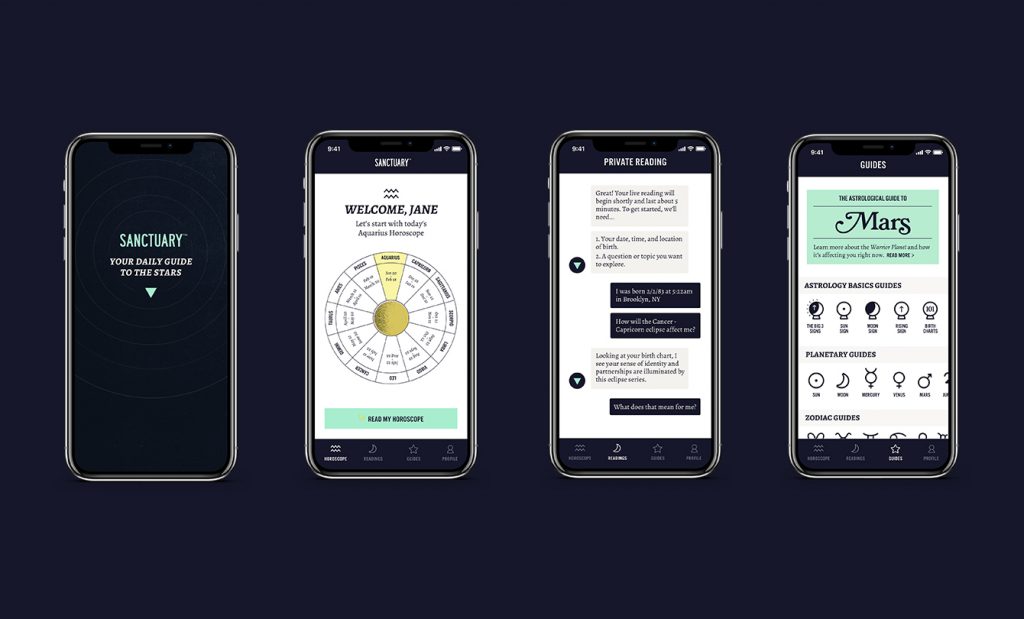
This history major is trying to peer into the future with his astrological reading app, Sanctuary.
Ross Clark C’04 is a Leo. His power emoji—a popular feature in his recently launched app that predicts a user’s mood for the coming day—is a pair of linked paper clips. It’s a cheeky metaphor for interconnectedness, which makes sense given his latest venture—an app called Sanctuary that connects astrological novices with astrological readers for bite-sized, personalized sessions about career woes, relationship troubles, and just about anything else on customers’ minds.
Sanctuary, whose March 20 launch coincided with the start of the astrological year, knows its target audience. It provides daily horoscopes and subscription-based readings in a forum that mirrors the pace and tone of a group chat between close friends. Horoscopes are quippy yet specific, with a playful mix of emojis and GIFs meant to soften the news of Mercury’s retrograde. The people behind these horoscopes are real, too. Each daily horoscope is curated by a team of in-house astrologers well versed in reading the stars and a Twitter feed, and every reading is done by a real person—unlike other apps that rely on algorithms in the growing mystical services market, currently valued at more than $2 billion.
“We’re focused on making astrology digestible because it can often feel very complex … and impenetrable,” Clark says. “It’s a really interesting way to reimagine the reading and also the access to it, because a lot of folks might not know a lot about astrology and are interested in learning their chart but don’t know who they should talk to. … I think our technology is democratizing access to what is a really incredible experience.”
Clark’s interest in astrology germinated during his first job after graduating from Penn. While working at a music industry PR firm, he clipped the New York Post’s horoscope section daily for his boss—a Pisces—and soon began reading his own horoscope as he walked it over to her desk.
“At the time, I was familiar with astrology but on a very surface level,” Clark says. “It got my interest very piqued.” He kept returning to astrology as his professional life progressed, first as a director of business strategy and development at Conde Nast, where he helped launch a horoscope series for Glamour magazine, and later as an independent developer working on a Facebook Messenger bot that provided daily horoscopes and eventually short-form readings.
“I felt like something was happening, especially on social [media], with the rise of all these astrology meme accounts,” he says, “And I started thinking about what you could build in the space and where the opportunities are for both a content experience and a business perspective.”
From there, the app was born. After working with a team of developers to transition the Facebook Messenger bot’s concept to a more interactive interface, Clark began his search for astrologers, starting with a core group of mystics in New York. Word of Clark’s venture spread, and Sanctuary now operates in five countries with more than 50 astrologers on call.

Clark believes that Sanctuary has proved to be attractive to investors, bringing in more than $3.5 million in venture capital money so far, because it’s so contemporary. Each daily horoscope includes a power emoji—such as a snake foreshadowing treachery, or a skyscraper predicting career growth. With features like this, Clark “hopes to strike the balance between having very insightful horoscopes [and communicating] in the language of today.” He plans to expand personalization for users in other ways, too. “Rapid venture-backed growth requires you to keep scaling pretty quickly, but I don’t think that should come at the expense of the experience,” he says.
Clark traces his career arc back to Penn, where he majored in history and was editor-in-chief of 34th Street Magazine. There he received his first lesson in “[designing] great content and experiences from an audience-based perspective.” In what was one of the most transformative experiences of his time as an undergraduate, Clark unveiled the first iteration of the magazine’s Style section, housing the potpourri of content he felt Penn students craved. More than that, Street taught Ross to be “scrappy”—which has influenced almost every decision he’s made since.
“At Street, we were volunteer and student-based with a very limited budget,” he says. “It took a lot of ingenuity and creativity to create a cover that’s going to grab people’s attention.
“I think that scrappiness has really informed how I thought about building our team, scaling the app initially. It’s also informed prioritization and how we think about the things we should be focused on right now.”
Clark’s latest goal? To broaden the scope of Sanctuary’s educational section, which offers basic astrology information—from the definition of a rising sign to instructions on how to read a birth chart. “There’s a really rich set of tools that exist to help you on your [spiritual] journey,” he notes.
Clark doesn’t view astrology as a fad, like a Paleo diet or eating activated charcoal. He believes we’re “moving into a new era” that’s “focused on self-reflection.” And astrology, he believes, “provides a system to analyze, reflect, and evaluate all of that chaos” in the world for some people. “We’re not focused on skeptics,” Clark says. “We’re focused on people who have an interest.”
“Astrology is deeper than a trend,” he adds. “It’s part of an overall journey toward wellness.”
—Beatrice Forman C’22




